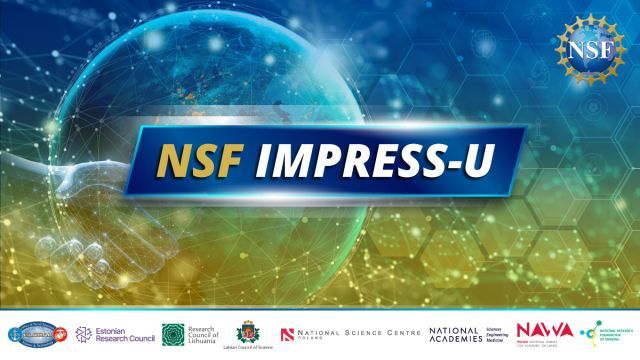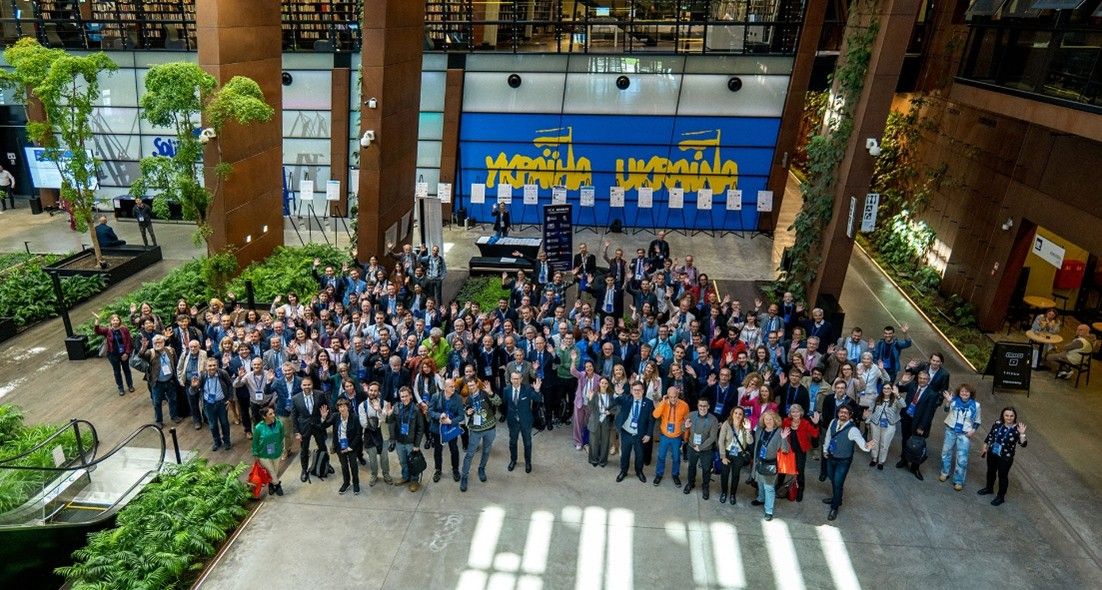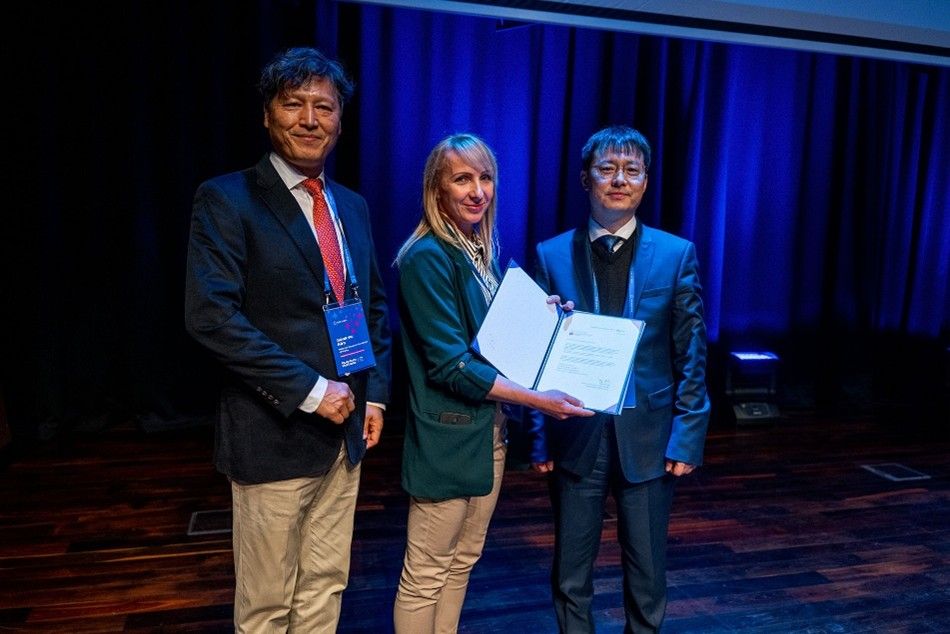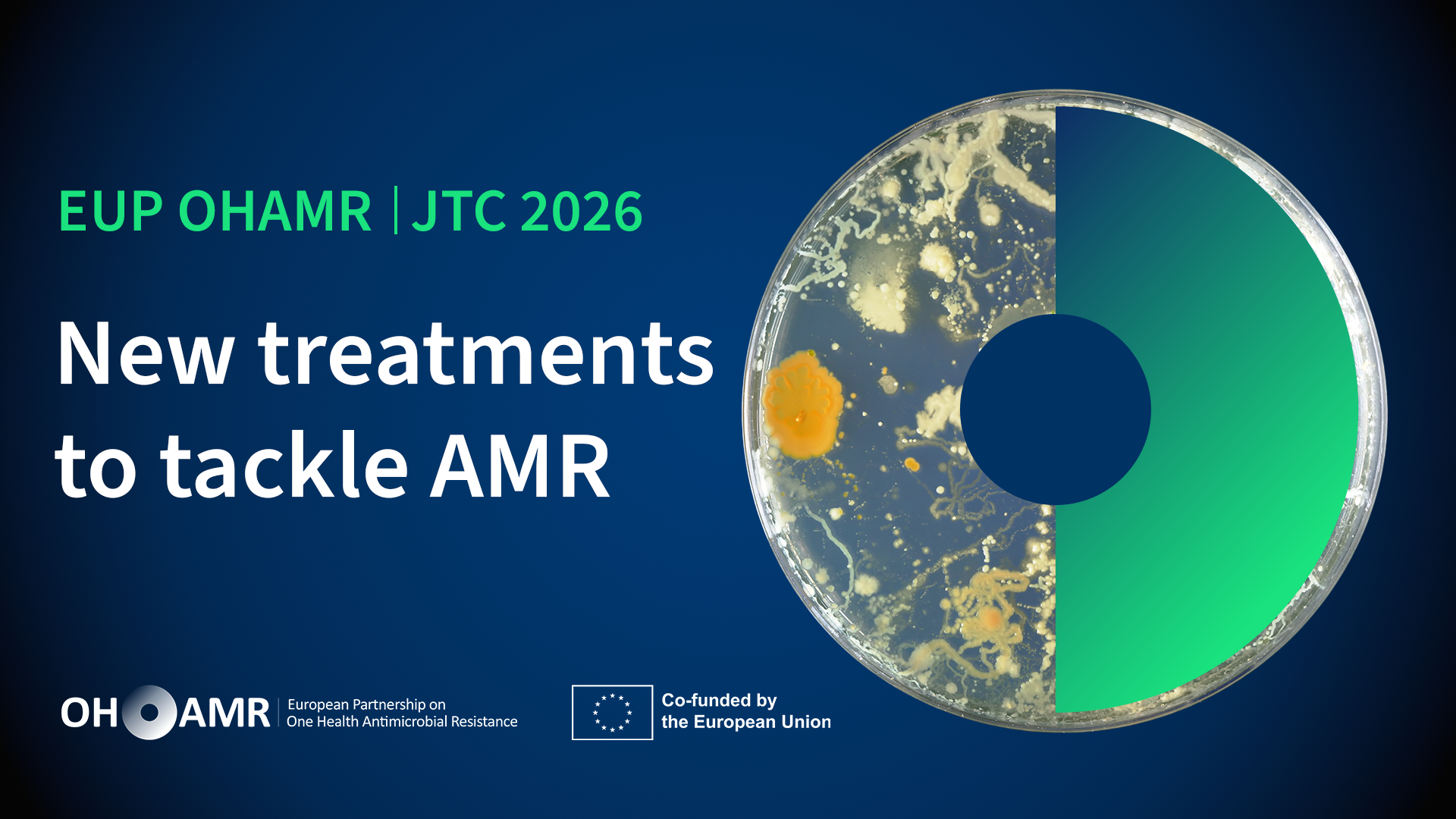“I noticed that problems with products often arise from neglecting basic research. It is basic research that is essential for addressing applied or industrial challenges. Without solid foundations, nothing works," says Prof. Urszula Stachewicz, whom we interview as part of the #NCNinterview series.
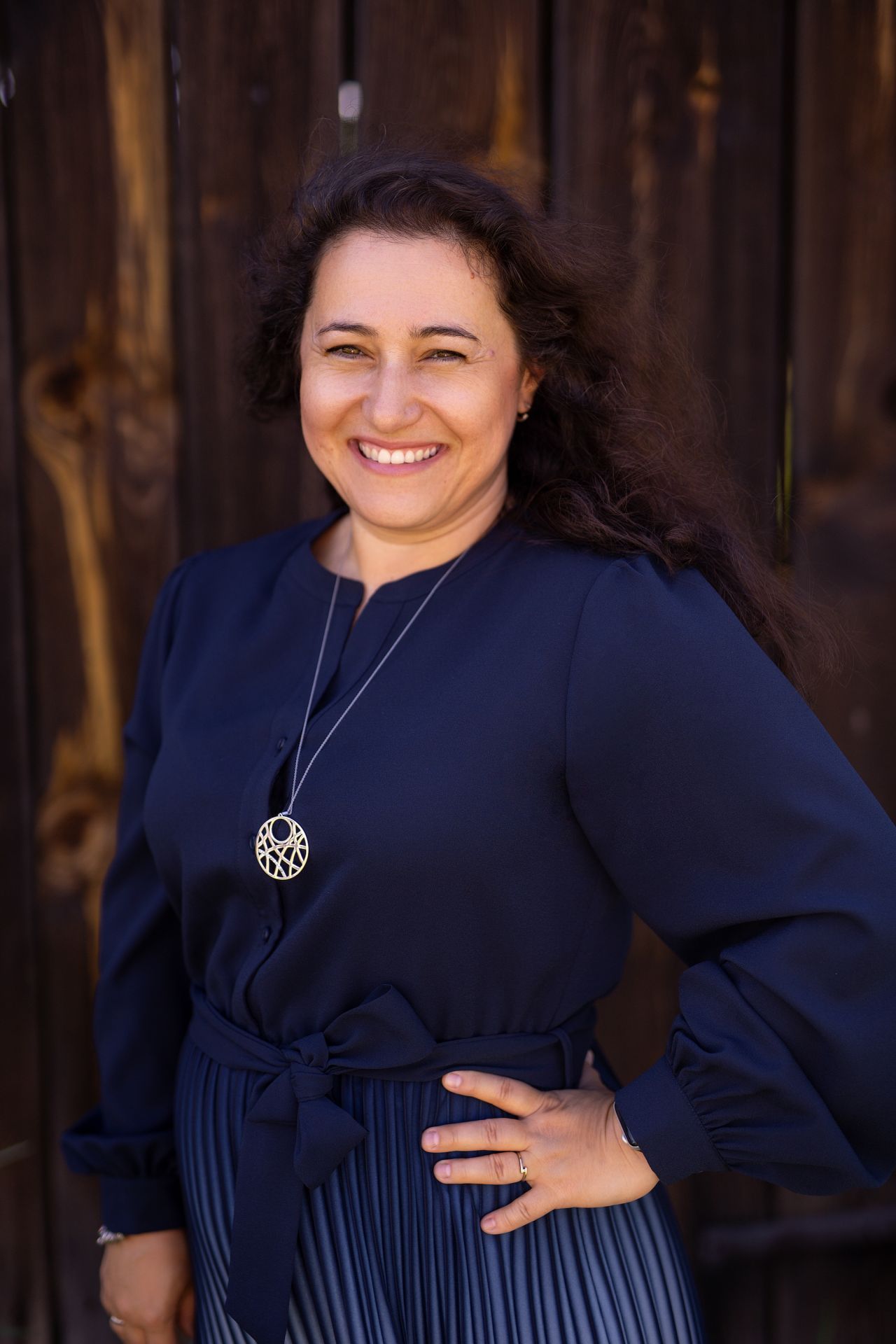 Urszula Stachewicz, photo: private archive
Professor Urszula Stachewicz investigates the electrospinning process as well as the surface and mechanical properties of polymer nanofibres. She is a member of the academic staff at the AGH University of Krakow. Previously, she worked at institutions including the Max Planck Institute, Delft University of Technology, Philips Research in Eindhoven and Queen Mary University of London. She has completed or is currently conducting five projects funded by the NCN, alongside research supported by the European Research Council.
Urszula Stachewicz, photo: private archive
Professor Urszula Stachewicz investigates the electrospinning process as well as the surface and mechanical properties of polymer nanofibres. She is a member of the academic staff at the AGH University of Krakow. Previously, she worked at institutions including the Max Planck Institute, Delft University of Technology, Philips Research in Eindhoven and Queen Mary University of London. She has completed or is currently conducting five projects funded by the NCN, alongside research supported by the European Research Council.
Electrospinning is a technique for producing extremely fine fibres – with diameters in the order of hundreds of nanometres or micrometres – through the use of an electric field. It makes it possible to create lightweight, porous materials with a very high surface-to-mass ratio, whose properties can be precisely tailored by selecting the polymer and process conditions. As a result, electrospun fibres find applications in a wide range of fields, from medicine and filtration to energy technologies and smart textiles.
Anna Korzekwa-Józefowicz: Does business reach out to you? The technologies you are working on could make life easier in many ways.
Urszula Stachewicz: Let me tell you when business first contacted us. It happened after we appeared in articles prepared by The Economist.
At the time, we were working on so-called fog collectors – meshes designed to harvest water from fog, created with communities in regions affected by drinking-water shortages in mind. A journalist from London contacted us; he was very eager to write about this technology. An article was published, followed by a podcast. You can publish dozens of scientific articles – even in Science or Nature – and no one from industry will get in touch. Yet after a single article in The Economist, people from around the world began reaching out.
Did any of those conversations develop into collaborations?
This is a simple and useful solution, a technology from which companies cannot easily generate profit. It does not require specialised installation or advanced maintenance – and, naturally, a company must have a revenue model. The meshes can even be mounted independently on simple frames and used to collect water from fog, so little emerged from those contacts in practical terms – but it was a highly interesting experience.
And then, two years later, The Economist published another article on the subject – and again there was a surge of interest. However, none of this interest came from Polish companies; it was exclusively from international ones.
The very idea of recovering droplets of water is not new.
Fog harvesting was already known in ancient times. We have merely returned to it, adapting it to contemporary conditions.
Fog collectors are used primarily in regions with low rainfall – in South America, especially in Chile, as well as in parts of Asia. In Europe, they are used only rarely. Water obtained from fog is not perfectly clean – if it is intended for drinking, it requires additional purification. Fog carries various contaminants, including those originating from the atmosphere. For economic applications – in agriculture, livestock farming or irrigation – this water works extremely well. Such solutions are greatly needed in regions where water resources are scarce.
The meshes typically cover an area of around 40 square metres. From such a surface – depending on weather conditions – it is possible to collect as much as 150 litres of water per day. As fog and wind pass through the fibres of the mesh, water droplets deposit and flow downward. A second mechanism also plays a role: condensation, which results from the temperature difference between day and night. It is precisely the same process that causes dew to appear on grass or on a windowpane in the morning. In nature, it is a highly efficient way of obtaining water.
In the regions I mentioned, such meshes are used by local organisations, foundations and community groups. Several companies manufacture these structures, and they can simply be purchased.
Since such structures are already used in practice, what did your team improve?
We incorporated electrospun nanofibres into the meshes, enabling them not only to collect water but also – when wind strikes their surface – to generate energy and measure wind strength. The functions we added transformed this solution into something more than a simple collector.
Nanofibres are much thinner than a human hair. Can they capture more water?
Yes. Traditional meshes have rather large openings, through which most of the fog simply passes without condensing on their surface. Our fibres have very high porosity – around 90 percent – and microscopic pores, which enable them to capture the smallest droplets of water, even those below one micron in size.
The idea emerged while I was working in London. At that time, I was studying the properties of nanofibres – including their wettability – for various applications, among them military uses, such as filters and masks. I knew how to control the structure of such fibres so that they would be hydrophobic, meaning water-repelling, or hydrophilic – water-attracting. At one point, I came across information about fog collectors and thought that our fibres could enhance their efficiency. We tested the idea and found that it indeed works.
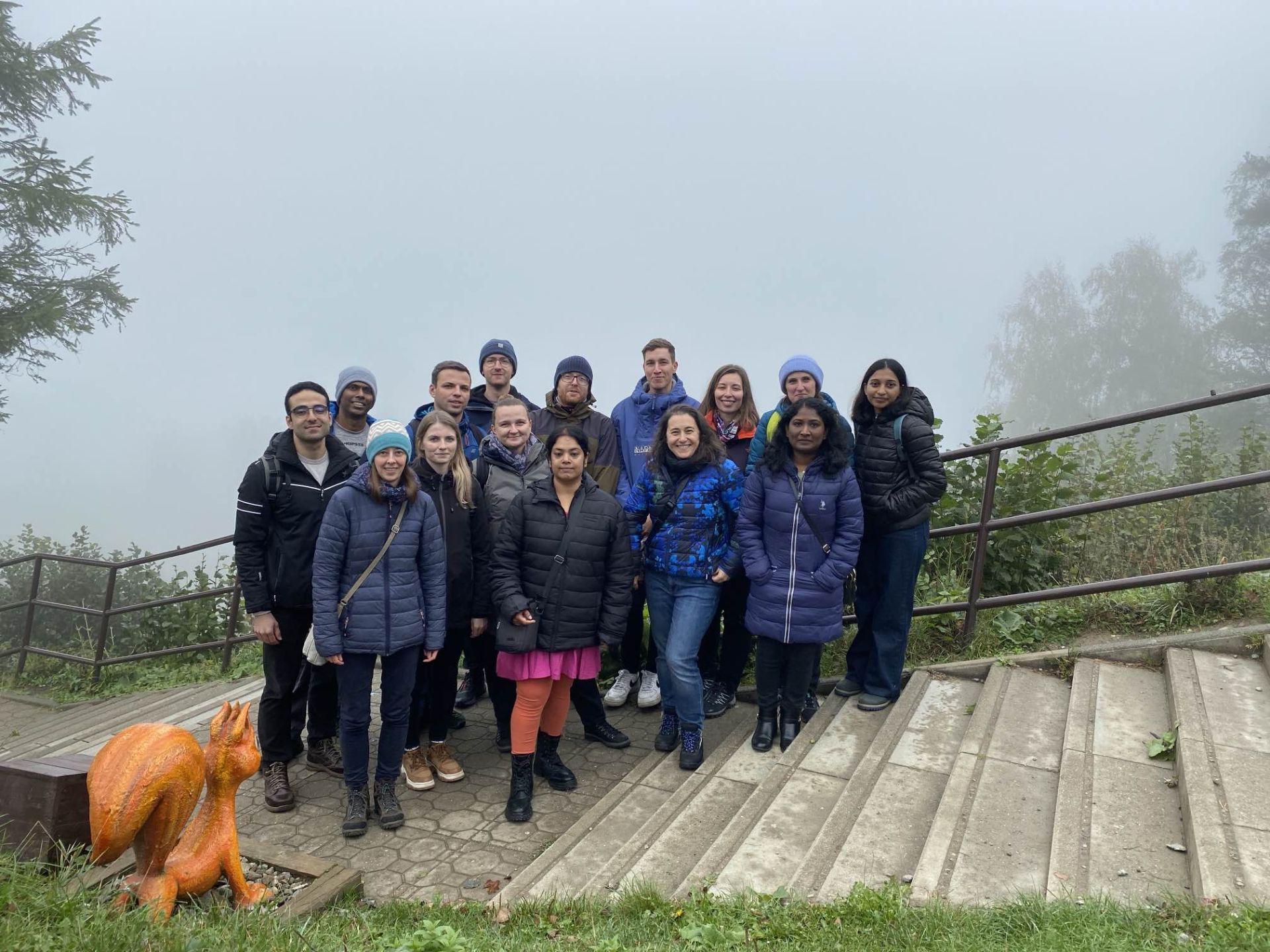 Urszula Stachewicz with her team, photo: private archive
In addition, we can manipulate not only the surface properties but also the mechanical properties of the fibres. The key is to combine two characteristics: hydrophilicity, which attracts droplets, and hydrophobicity, which allows water to flow quickly off the surface, making room for new droplets. Only this combination yields high efficiency.
Urszula Stachewicz with her team, photo: private archive
In addition, we can manipulate not only the surface properties but also the mechanical properties of the fibres. The key is to combine two characteristics: hydrophilicity, which attracts droplets, and hydrophobicity, which allows water to flow quickly off the surface, making room for new droplets. Only this combination yields high efficiency.
Based on this, we developed various material configurations with differing structures and properties – which resulted in a number of interesting publications and research findings.
Poland is one of the European countries, alongside Cyprus, Malta and the Czech Republic, experiencing chronic water scarcity. Was there no interest in developing this project?
One of the national parks in Poland contacted us with the idea of installing such a collector. However, our meshes are not yet large enough to operate efficiently under local conditions. We also do not have the equipment needed for large-scale production.
To what extent is it important in your work that research has a practical dimension?
I look for partners for various implementation projects. I believe that science must be useful. I realised this while completing my doctorate at Philips Research in Eindhoven. That was when I saw how a large corporation operates. Everything had its own rhythm and procedures; one had to log activities, submit reports, participate in meetings. Later, when I worked in London, in a small spin-out company, the experience was entirely different – one had to do all sorts of things, from conducting research and writing proposals to cleaning the laboratory and speaking with clients. Two completely different worlds. After these experiences, I decided that I wanted to pursue research in academia – I wanted to understand what I was doing. In a large company, what mattered were results and profit. In a small one, you had to handle everything at once.
I also noticed that problems with products often arise from neglecting fundamental research. It is basic research that is essential for addressing applied or industrial challenges. Without solid foundations, nothing works.
When I returned to Poland, I was delighted to discover that an institution such as the NCN exists – one that funds basic research specifically. Thanks to funding from the SONATA 8 call, in which we worked on biomedical scaffolds for bone regeneration, I was able to purchase my first electrospinning set-up and begin a new line of research at AGH. The experience gained and the contacts established during that project enabled me to apply for further funding and to develop the idea for an ERC grant.
Fibres of the future
You have also worked on burn dressings using electrospun nanofibres, and in your ERC project you are using electrospinning to create thermal-insulation materials that may be applied in the construction sector.
We understand the electrospinning process very well: we know how electric charges interact with the functional groups of polymers and how to control the parameters of the solutions and the atmosphere. This allows us to create fibres with diverse properties and applications – ranging from biomaterials to materials used for energy harvesting.
For example, by controlling the charges on the fibre surface, we can influence cell behaviour: fibres with a positive surface charge attract negatively charged cells, which supports their growth. Conversely, a difference in charge between material layers allows energy to be generated – this is referred to as triboelectricity. When a material bends and produces charges, the phenomenon is piezoelectricity. The same properties can therefore be used both for energy generation and for guiding biological processes.
Depending on the intended application, we select polymers that are biodegradable, biocompatible or mechanically robust. We also adjust the structure of the fibres, their porosity and the number of layers. In the ERC project, we are examining their thermal-insulation properties, including in combination with so-called phase change materials, which can store and release heat. High porosity makes these fibres excellent thermal insulators, while their large surface area enables both the storage of energy and its subsequent reuse.
The same principle applies in other applications – the large surface area facilitates the capture of water from fog or supports cell growth, as the structure resembles the extracellular matrix. In so-called smart textiles, these materials can breathe, generate energy from movement and function as pressure sensors.
My team includes biophysicists, materials engineers, chemists and bioengineers. Some are excellent at conducting cell studies, others specialise in material characterisation. Not everyone can perform electrospinning, but each person contributes something essential – without which the team could not function. We are now applying for more implementation-oriented projects, particularly those related to medical applications. I dream of establishing a laboratory in which we could produce medical products on a larger scale. But this is more a prospect for the next dozen or so years.
What would such a medical laboratory look like?
The medical field is an area in which new technologies can quickly find practical application and help address specific health challenges.
It would have to be a top-class facility, meeting full medical grade standards. Such a laboratory could prepare prototype medical products for companies – developing the complete formulation and then transferring it for implementation. It could also produce drug-delivery matrices, scaffolds for tissue engineering, or materials for research purposes. Centres operating at this level in electrospinning already exist in Europe, and it is my aspiration for a similar facility to be established in Poland, to demonstrate that it is equally feasible here.
I have been building the current laboratory step by step. Today, it is an integrated system of four units – from fibre fabrication, through material characterisation, to biological and application testing. We would like to continue developing this model and expand the laboratory so that we can move on to the stage of creating actual products, but we are already lacking space – both literally and figuratively. We constantly encounter constraints in terms of available room and infrastructure.
How long does it take to move from an idea to the point where you can demonstrate that a technology works?
Usually around two years. From producing and developing a material to publication or implementation, which is roughly the cycle.
Are products based on electrospun nanofibres already available on the market? Can they be purchased?
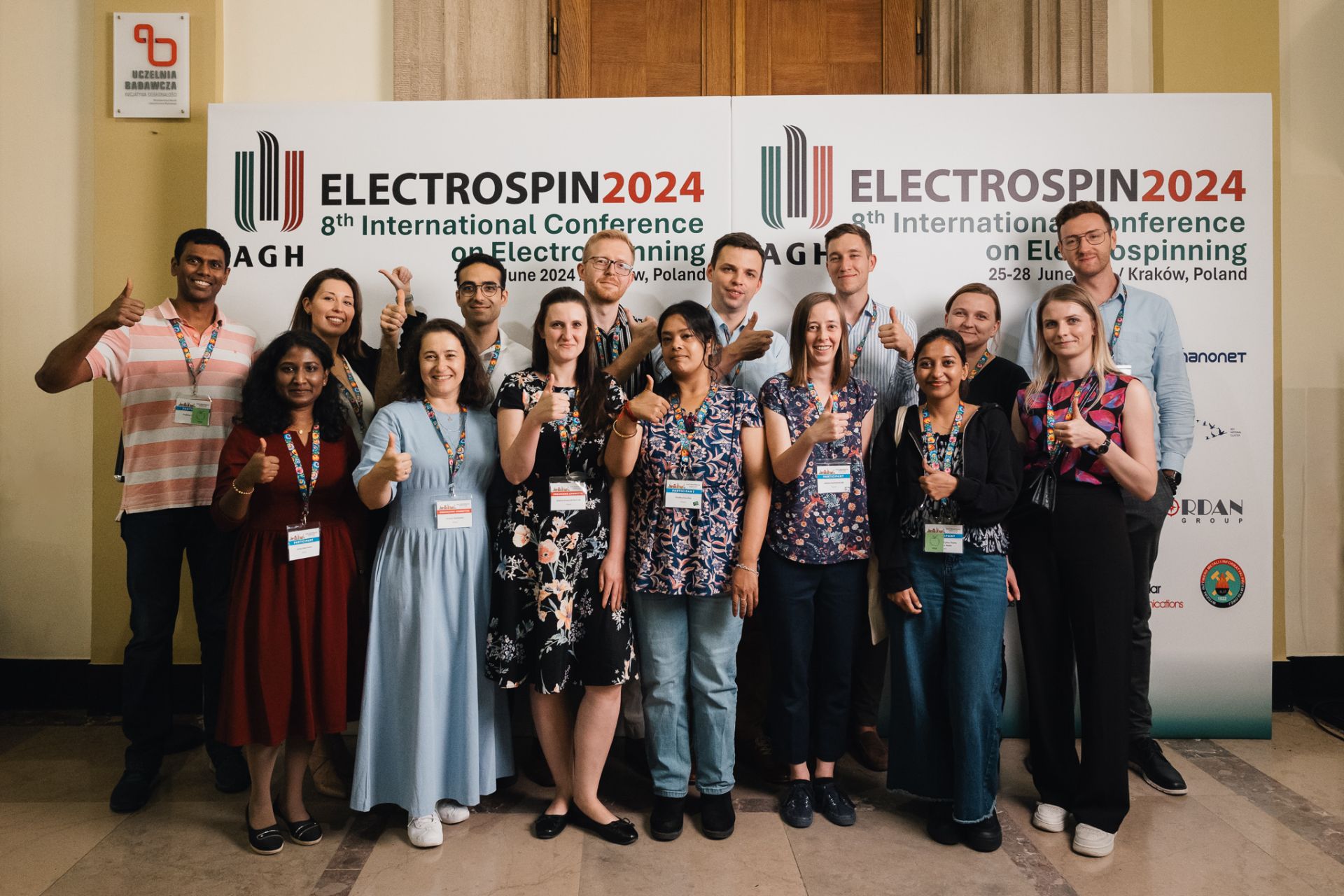 Urszula Stachewicz with her team, photo: private archive
There are already many products based on this technology; it is widely used, for example, in air filters. Globally, China is a leader in this area. A few years ago, at one of the conferences, a professor from China even appeared wearing a shirt made from electrospun fibres. In Europe, a major Czech company – Elmarco, founded as a spin-off of the University of Liberec – specialises in the industrial production of nanofibres. Elmarco is present at every electrospinning conference, showcases its solutions, collaborates with researchers and secures European grants. This is how visibility and standing in the sector are built.
Urszula Stachewicz with her team, photo: private archive
There are already many products based on this technology; it is widely used, for example, in air filters. Globally, China is a leader in this area. A few years ago, at one of the conferences, a professor from China even appeared wearing a shirt made from electrospun fibres. In Europe, a major Czech company – Elmarco, founded as a spin-off of the University of Liberec – specialises in the industrial production of nanofibres. Elmarco is present at every electrospinning conference, showcases its solutions, collaborates with researchers and secures European grants. This is how visibility and standing in the sector are built.
Their example demonstrates how a simple idea can become a modern technology. They manufacture fibres that can be used in inserts for athletic shoes, in breathable textiles, in military materials and even in acoustic insulation. This shows that innovation does not need to be complicated to have economic significance. What is needed are companies capable of implementing it.
Have you ever considered starting such a company yourself?
Scientists think in terms of science, not business. What is needed here are people who know the market, can communicate with investors and understand how to build relationships and secure funding. I can develop the technology, but someone else has to recognise its potential and take care of the market side.
A different starting point
You spent many years working abroad. Researchers who return to Poland often struggle to readjust to working conditions here. Are the differences significant?
I was aware that after years of working abroad, I thought differently – I approached work, time management and team communication in a different way. None of this was taught here. In the companies where I had previously worked, training in topics such as time management, cultural awareness or dealing with e-mails was standard practice. Thanks to this, I learned how to plan and how to build effective teams, but in Poland I had to implement these practices on my own.
In the first months after receiving the ERC grant, I received e-mails with offers, because abroad a researcher with an ERC grant is viewed as an investment opportunity. At Maastricht University, I saw that a new hire is provided with a ready-to-use laboratory, equipment, and facilities – they can start working immediately. In Poland, however, there is no such thing as starting money; there are no laboratories with technical support available for a young professor to begin work right away. It took me ten years to build my laboratory. All the equipment we have was purchased through my research projects. I started with no equipment at all – I only had access to a scanning electron microscope. Now researchers from abroad come to us and say: "Your lab looks excellent.” But reaching this point required time, determination and a clear vision.
Another problem is the scale of bureaucracy. The number of documents, confirmations and photographs required was a cultural shock for me. In Poland, we often have to prove that we have not done something incorrectly. For example, when participating in a poster session, we must take photographs with the poster, because auditors may ask whether it was indeed presented. This lack of trust stems from our history – from a system in which people were taught for years to find ways around the rules – and it is changing only slowly.
What other changes would make your work easier?
We collaborate with various research groups, but we are also capable of producing excellent work on our own – often just as well, and sometimes even better. And that is precisely where the problem lies. When only an AGH affiliation appears next to your name, some editors are reluctant to pass our papers on. For many, our university is still not widely recognisable, and the old rule continues to apply: the name matters more than the quality. Editors receive thousands of manuscripts and often do not have the time to read each one carefully.
That is the reality. And yet we publish in leading journals such as Advanced Functional Materials. We want to demonstrate that high-level research can also be conducted in Poland.
The problem of insufficient international recognition of Polish universities was also raised by one of my previous interviewees, Professor Róża Szweda. She noted that editors of major journals should be invited to visit us.
That is an excellent idea. I collaborate with one of the institutes in Korea. When I visited them, a colleague said to me: “Our rector is currently in Germany meeting with editors from Wiley, because he is negotiating a special issue of Advanced Materials for our university.” Advanced Materials is one of the most important scientific journals in the world in the fields of materials science and nanotechnology. And their university treats the preparation of such a special issue as part of its development strategy.
And here? Do any rectors in Poland do anything similar? We do not even have a national agreement with Wiley for open-access publishing, although we do have agreements with Elsevier, Springer and ACS. This shows that in some countries it is well understood that high-level research and publishing are an investment in national development. In Asia this is obvious – science, technology and innovation are priorities.
In Poland, investments in science are often treated as a cost that is expected to pay off within a single term of office. But science does not work that way. What is needed is a long-term vision for the development of science – something that, unfortunately, we still lack in Poland.
At the NCN, together with researchers, we have been trying for months to convince policymakers that science is an investment.
Science is the foundation of technological and economic development. Countries that invest in research – in materials, energy technologies, new solutions for medicine – see the results in industry, innovation and quality of life after several or a dozen years. This does not happen from one year to the next – it is a long-term endeavour. But if the investment is made today, in a decade the difference will be enormous: in the country’s development, in the types of companies that emerge, and in the jobs created by new technologies.
I would allocate as much funding as possible to institutions such as the NCN, because everything begins with fundamental research. In reputable journals, one must always demonstrate the potential practical relevance of the results obtained. This encourages asking specific questions: What follows from this discovery? In what ways can it be used? How does it fit in with existing technologies? And then it becomes clear how advanced research can be when it stems from a simple, fundamental question.
In this year’s #NCNinterview series, we have already spoken with Zuzanna Świrad, a geomorphologist working, among other places, at the Polish Polar Station in Spitsbergen; Krzysztof Szade, a biochemist studying haematopoietic stem cells; Karolina Zielińska-Dąbkowska, an architect and lighting designer; Wojciech Małecki, a literary scholar; Zofia Boni, a social anthropologist; and Natasza Kosakowska-Berezecka, an intercultural psychologist and expert in equality and diversity. The series has been running since 2023, and all interviews are available on the website: #NCNinterview.





